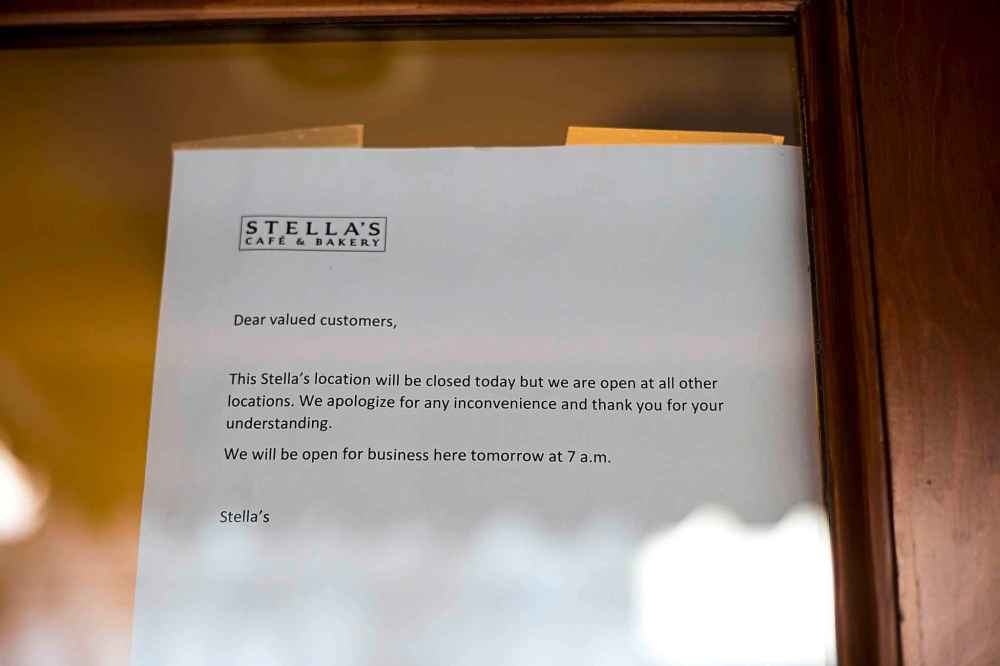Stunned by Stella’s: torrent of employee-abuse and harassment allegations unprecedented Restaurant, hospitality educator says torrent of employee-abuse and harassment allegations unprecedented
Read this article for free:
or
Already have an account? Log in here »
To continue reading, please subscribe:
Monthly Digital Subscription
$0 for the first 4 weeks*
- Enjoy unlimited reading on winnipegfreepress.com
- Read the E-Edition, our digital replica newspaper
- Access News Break, our award-winning app
- Play interactive puzzles
*No charge for 4 weeks then price increases to the regular rate of $19.00 plus GST every four weeks. Offer available to new and qualified returning subscribers only. Cancel any time.
Monthly Digital Subscription
$4.75/week*
- Enjoy unlimited reading on winnipegfreepress.com
- Read the E-Edition, our digital replica newspaper
- Access News Break, our award-winning app
- Play interactive puzzles
*Billed as $19 plus GST every four weeks. Cancel any time.
To continue reading, please subscribe:
Add Free Press access to your Brandon Sun subscription for only an additional
$1 for the first 4 weeks*
*Your next subscription payment will increase by $1.00 and you will be charged $16.99 plus GST for four weeks. After four weeks, your payment will increase to $23.99 plus GST every four weeks.
Read unlimited articles for free today:
or
Already have an account? Log in here »
Hey there, time traveller!
This article was published 16/11/2018 (2579 days ago), so information in it may no longer be current.
In the fast-paced, pressure-filled world of the Canadian restaurant industry, Bruce McAdams thought he had seen and heard just about everything.
But the assistant professor at the school of hospitality, food and tourism management at the University of Guelph was struck by the wave of allegations of abuse and worker mistreatment made last week against Stella’s, the popular Winnipeg restaurant chain.
“This thing that has come out of your city is like nothing I’ve seen,” McAdams says.

Since last Thursday, an Instagram account called @notmystellas has received more than 275 stories from people who have worked in various positions throughout the company’s seven locations, documenting everything from sexual harassment to unsafe working conditions.
The Free Press has also heard from more than 20 former and current employees whose personal accounts paint a disturbing picture of a company with little regard for the people it employs.
As an advocate for a stronger and more sustainable restaurant industry, McAdams has been following this story closely. While it’s tempting to view it as a microcosm for the restaurant industry as a whole, he says Stella’s is unique.
“Based on the accusations, if they are true, then they are checking all the boxes for things you can do wrong,” he says.
“Restaurants do have to work better at things like breaks, sick days, competitive schedules — those things aren’t rampant, but they are present in the restaurant industry in Canada,” he says. “It is a unique environment. It’s a transient workforce, a young workforce, it’s a diverse workforce that includes many members of marginalized groups. There’s physical work, it’s high stress, alcohol is served. There’s sexualization of servers, there’s inequity in terms of representation of women at higher levels of management.
‘Based on the accusations, if they are true, then they are checking all the boxes for things you can do wrong.’
— Bruce McAdams
“Yes, it exists in our industry and is need of addressing. I think we’ve gotten better in some issues — the harassment issue we’ve definitely made progress and continue to make progress. When it comes to adhering to labour standards and progressive work environments, I’d give us a D. Maybe a C-minus. We need to pull up our socks.”
For the front-line staff currently working at Stella’s, this past week has been especially stressful.
“We were being harassed by customers,” says a current employee, who does not want to be identified, adding that servers were given no guidance from upper management on how to respond to customers.
“I had a customer ask me how I could let this happen. We had calls, we had emails. We had people come in, obviously, but we’ve had people stay away. Our sales have plummeted. I know everyone says ‘solidarity with Stella’s employees,’ but I say hit them where it hurts.
“I’m glad people didn’t come in.”

She says that people’s anger is understandable, even if it’s misdirected. It’s understandable, too, that people might even feel betrayed by Stella’s. This is a company that cultivated an image of friendliness; approachable food, served by approachable people. The fact it’s a local chain is precisely what attracted many of its employees, including this one.
“I’d eaten at Stella’s before,” she says. “Everyone seems happy and bubbly and the food is good. It was the first place I applied to.”
It wasn’t long before she became disillusioned with Stella’s sunny-side-up disposition. “Everyone was demoralized. I felt like everyone was walking on eggshells. It was also very competitive. Everyone looks left and right at all times, afraid of making mistakes.”
And mistakes could cost you shifts. Many employees the Free Press spoke to talked about “competitive scheduling.” According to Noël Pruden, who worked in various kitchen management positions over the five years he was employed, servers are ranked on a scale from A to D. The A’s are the all-stars; D’s are people with poor skills and poor attitudes. The ranking system could be arbitrary; names could be switched around at random.
“We were told to go through our schedules and write these letters beside their names, and put them in that order on the schedule,” he says. “They didn’t tell us to sit down with anyone and have a meeting. There was no mention of what the followup was supposed to be.”
‘I had a customer ask me how I could let this happen. We had calls, we had emails. We had people come in, obviously, but we’ve had people stay away. Our sales have plummeted. I know everyone says solidarity with Stella’s employees, but I say hit them where it hurts.’
— Stella’s employee
“This is a system to keep people in line and push them the hardest at all times,” says the current employee. “It became apparent to me that if you call in sick or if you have a day where you are a little bit off, you will be cut shifts. It’s used as a punishment. We work with mostly young women who are right out of high school, barely in university, who are so vulnerable to this. They accept this as a given.”
Then, of course, there’s the matter of harassment. The restaurant industry has a long history of bullying and harassment which, McAdams says, typically comes from the kitchen and dates back to the late 1800s when French chef Georges-Auguste Escoffier developed the kitchen brigade system still used today.
“It was militarized; he was from the navy, he’d had kitchens in the military,” McAdams says. “It’s what we call a command-and-control, militarized approach to leadership. That became ingrained in our kitchen culture.”
The objectification and sexualization of mostly female servers coupled with the toxic masculinity of the kitchen was also a recipe for abuse.
“You have men in aprons cooking, which, in the old days, some would consider women’s work, so there was this over-masculinization of their own work,” McAdams says. “And then in the ’90s and early 2000s, this jocular approach to Gordon Ramsay-ish kitchens, ‘I’m a man, and I’m the boss and I’m going to yell and scream.’”

That said, McAdams notes that attitudes in the industry have been shifting. “I get the feeling we’re trying to change, but we need to go faster and be more collaborative,” he says.
He points to some guiding lights, including WITHorg (Women in Tourism and Hospitality Organization), which is working to close the gender leadership gap, and It’s Your Shift, a five-module online program on harassment developed by the Ontario Restaurant Hotel & Motel Association. Female chefs such as Amanda Cohen and Dominique Crenn represent a new generation of leaders. The “that’s just how it is” excuse no longer flies.
“I’ll tell you, that example of Stella’s is the exception,” McAdams says. “The majority of kitchens are ‘fair’ to ‘good employers, but the other problem is, we have very few ‘fantastic’ employers. If you look at the list of Canada’s Top 100 employers that came out last week, there was not one restaurant company, which is insane, given the number we have.”
Statistics back this up. While Stella’s has been in the news, there are no shortages of complaints against other restaurants in the city. According to the province’s Employment Standards branch, more than 300 complaints have been lodged so far in 2018.
Per Restaurant Canada, there are 80,000 restaurants in this country, employing more than one million people. The majority of those restaurants are focused on being great places to eat. Too few of them, however, are focused on being great places to work — and that, to McAdam’s mind, is a source of many of the industry’s issues.
‘It became apparent to me that if you call in sick or if you have a day where you are a little bit off, you will be cut shifts. It’s used as a punishment.’
— Stella’s employee
“We treat employees more like expenses than assets,” he says. “We are very focused on our labour costs. It’s our most controllable cost. There’s minimum wage going up, so managers and chefs are trying to get people off the clock, maximizing productivity; they may be working people through breaks because of all these pressures.
“We’re in the moment, trying to manage these costs as opposed to looking at people as assets and saying, ‘These people are going to be key to my restaurant’s growing revenue and increased productivity.’ I think that is innate in restaurant DNA in Canada in how we manage people. There are companies that do look at people as assets — but there’s not enough.”
That assessment lines up with Pruden’s experience as a kitchen manager. “Your expectations were to have a very low labour cost and a very low food cost,” he says. “If you managed to meet those numbers you’d be given a bonus at the end of the quarter. I found the expectations put you under so much stress to cut people’s hours. It bounced back on to the staff in a negative way.”
The current employee says at Stella’s, “you are a disposable, interchangeable commodity at all times. And the company makes sure you know that.”
“Somebody sat down and developed these ways of making the most out of people, like an orange to squeeze,” she says.

The employee who still works at Stella’s would like to see a wholesale revamp in how the company treats its employees — from allowing water breaks to managing from a place of motivation, instead of fear.
“This is a chance for change,” she says. “This is a chance for them to step up as human beings and give people their dignity back.”
“(Stella’s) is an unfortunate situation and I feel for those involved,” McAdams says. “I appreciate the fact that it’s been brought out into the public realm, and I think it provides us, as an industry, a huge opportunity to reflect and evaluate where we are and come together collaboratively to try to continue to improve what we’re doing as employers.”
jen.zoratti@freepress.mb.ca
Twitter: @JenZoratti

Stella’s responds
Since these disturbing and serious allegations have come to light, People First HR Consultants have begun an in-depth and independent investigation and review to determine where we went wrong, and together we have quickly put in place processes to begin to make it right.
So far, our management team has received respectful workplace training from People First HR consultants and all our remaining front line staff will receive paid training on Monday. People First also has a consultant at each of our locations to field questions and engage with staff about any concerns or questions they have.
We are working to update our policies, and are deeply committed to creating a safe, healthy and secure workplace for all 500 of our employees going forward.
— Stella’s
Company has faced 11 Employment Standards complaints since 2015
According to a provincial spokesperson, Employment Standards has had 11 claims filed against Stella’s restaurant chain since 2015. One claim is still active; the remainder were resolved voluntarily.
In addition to Employment Standards complaints, Workplace Safety and Health (WSH) received one complaint of harassment against Stella’s in November 2017. WSH investigated that complaint and determined Stella’s had a harassment policy in place, and the incident had been investigated as required under legislation.
“WSH and Employment Standards have been made aware of the allegations against Stella’s through the recent social media posts and will be contacting the employer to ensure appropriate steps are taken to address the issues raised, and will conduct any investigations necessary within our jurisdiction,” the spokesperson said via email.
Since January 1, 2018, Employment Standards has received 301 restaurant claims and 58 hotel/accommodation claims. Employment Standards has also conducted 30 compliance reviews on restaurants since Jan. 1 of this year. Over the past year, WSH received a total of 32 complaints related to the restaurant and hospitality sector, 12 of which were harassment complaints.

Jen Zoratti is a Winnipeg Free Press columnist and author of the newsletter, NEXT, a weekly look towards a post-pandemic future.
Our newsroom depends on a growing audience of readers to power our journalism. If you are not a paid reader, please consider becoming a subscriber.
Our newsroom depends on its audience of readers to power our journalism. Thank you for your support.
History
Updated on Saturday, November 17, 2018 10:26 AM CST: Headline tweaked.














